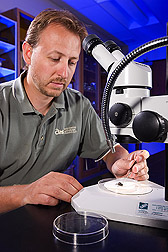02
Dec
Embattled Scientist Receives Prestigious Civic Courage Award
(Beyond Pesticides, December 2, 2015) On Monday, Jonathan Lundgren, PhD, the U.S. Department of Agriculture (USDA) entomologist suspended by the agency for his work on neonicotinoids, received a prestigious national award for civic courage after speaking out on his pesticide research despite what he says is the agency’s effort to “suppress” his work. In October 2015, Dr. Lundgren filed a whistleblower complaint against USDA, citing unprofessional retaliation following the publication of his study linking neonicotinoid insecticides to the decline of monarch butterflies.
 Dr. Lundgren, Senior Research Entomologist and Lab Supervisor for the Agricultural Research Service (ARS), received the Joe A. Callaway Award for Civic Courage, intended to honor those who “at some personal risk, take a public stance to advance truth and justice, and who challenge prevailing conditions in pursuit of the common good.” This honor comes as Dr. Lundgren is fighting his suspension for publishing research deemed “sensitive” by his USDA superiors. According to USDA, he had made inappropriate remarks in the workplace, and discussed sensitive topics with the press.
Dr. Lundgren, Senior Research Entomologist and Lab Supervisor for the Agricultural Research Service (ARS), received the Joe A. Callaway Award for Civic Courage, intended to honor those who “at some personal risk, take a public stance to advance truth and justice, and who challenge prevailing conditions in pursuit of the common good.” This honor comes as Dr. Lundgren is fighting his suspension for publishing research deemed “sensitive” by his USDA superiors. According to USDA, he had made inappropriate remarks in the workplace, and discussed sensitive topics with the press.
In September 2014, Dr. Lundgren filed a complaint citing violations of USDA Scientific Integrity Policy with the Scientific Integrity Office and stating that allegations of his misconduct stemmed from ulterior motives. His case, which is being represented by Public Employees for Environmental Responsibility (PEER), underscores why legal protections for government scientists are sorely needed. PEER argues that language in the current policy actually encourages the suppression of scientific study where large agribusiness corporations’ reputations are at stake. PEER explains that USDA management regularly uses its inadequate Scientific Integrity Policy as reason for suppressing technical work of employees when industry stakeholders disagree with the scientific conclusions.
Earlier this year, Dr. Lundgren published research that shows the adverse effects of neonicotinoid insecticides on monarch butterflies and bees. According to Dr. Lundgren, USDA attempted to hamper his efforts to publish the research and barred him from speaking with the media about his work. The agency also suspended him for 14 days in August for publishing the report, which USDA deemed “sensitive” and for having errors in travel authorization forms related to his presentation of the report. His complaint argues that, “This abrupt onset of actions undoubtedly appears to have been prompted by the scientific activities that are supposed to be specifically safeguarded and encouraged under the USDA Scientific Integrity Policy.”
Dr. Lundgren believes the award could encourage additional dialogue about academic and scientific freedom. “The whole situation has changed my career trajectory as a result of this. I was simply doing my job, but because the science is not convenient, it elicited a pretty severe reaction,” Dr. Lundgren told the Capital Journal in a recent telephone interview. “Hopefully it will open the door so that other scientists are able to have complete and unencumbered freedom to discuss their research and where it fits into the grand scheme of things within the federal government and within university systems as well. Scientific freedom is the same as freedom of speech. If we don’t have it, how can we move forward as a society? If we can’t even discuss certain topics because they’re too controversial, then we’re in serious problems. We’re in for trouble.”
“There was official effort to stop me from talking about science that was creating inconvenient results,” Dr. Lundgren said. “I was sort of forced into filing complaints and standing up for what I thought was right.” Dr. Lundgren received his award Monday at an evening ceremony at the Carnegie Institute Building in Washington, D.C.
His research on the controversial neonicotinoid insecticides is part of a growing body of scientific evidence that finds that this class of pesticides if highly toxic to bees and harms other beneficial species as well including butterflies, birds and aquatic organisms. The widespread use of these chemicals on corn and soybean crops, as well as in home garden products means that they also end up contaminating waterways. For more on neonicotinoids and what you can do, visit our BEEProtective page.
Advocates argue that it is critical that federal scientific agencies tasked with protecting human and environmental health are able to inform the public without repercussions from an industry whose only interest is protecting profits. For more information, see PEER’s pattern of science manipulation at USDA.
All unattributed positions and opinions in this piece are those of Beyond Pesticides.
Source: Capital Journal










